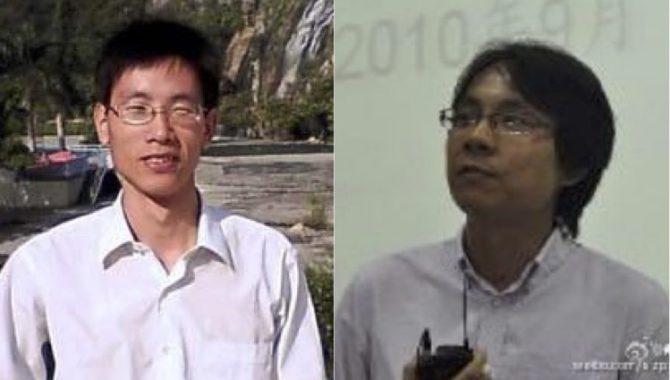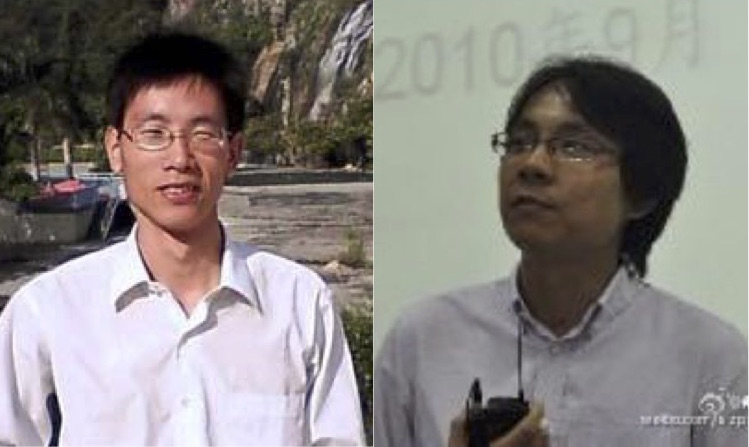Police Detain Two Rights Advocates as NGO Crackdown Intensifies
Comments Off on Police Detain Two Rights Advocates as NGO Crackdown Intensifies
(Network of Chinese Human Rights Defenders – June 15, 2015) – On the evening of June 12, Guangdong police acting in coordination with state security officers from Beijing and Henan Province seized two activists and detained them on suspicion of “illegal business activity.” Guo Bin (郭斌), head of the NGO Zhongyixing that advocates for the rights of persons with disability, is currently being held at Futian District Detention Center in Shenzhen. Yang Zhanqing (杨占青), who now works independently after previously working with a health rights and anti-discrimination group is being held at Huiyang District Detention Center in Huizhou City. They will reportedly be moved to Zhengzhou No. 2 Detention Center in Henan Province on June 15. Both men have worked with NGOs pushing for policy reform and the promotion of the rights of persons with disability or those facing discrimination due to certain health conditions such as Hepatitis B. They also advocate for consumer rights and food safety, equal education and employment opportunities, and the rights of sex workers.[1]

Disability/health rights activists Yang Zhanqing (杨占青) (left) and Guo Bin (郭斌) (right) are in police custody after being detained on June 12 in Guangdong Province
The detention of Guo and Yang indicates an intensifying crackdown on NGOs under President Xi Jinping. It is in step with the month long detention earlier this year of the Five Feminists—Li Tingting (李婷婷), Wang Man (王曼), Wei Tingting (韦婷婷), Wu Rongrong (武嵘嵘), and Zheng Churan (郑楚然). The five women remain under police surveillance as criminal suspects after they were released on “bail pending further investigation.” The government has recently targeted those who work on what had generally been considered “politically non-sensitive” issues, such as health rights, women’s rights, LGBT rights and anti-discrimination.
These two newest detentions follow a trend in China’s criminalization of NGO activists by accusing them of the crime of “illegal business activity.” In May 2014, police detained lawyer Chang Boyang (常伯阳) for “illegal business activity” for six months. Police subsequently raided the office of the NGO Zhengzhou Yirenping, which Chang co-founded and served as legal counsel, and interrogated other staff members. Earlier this year, the office of the NGO Beijing Yirenping was also searched, and the organization singled out by the foreign ministry as having “violated the law.” Additionally, Guo Yushan (郭玉闪), the co-founder and former director of independent think tank the Transition Institute, and He Zhengjun (何正军), the group’s administrative director, have spent six months in detention and face trial imminently also on charges of “illegal business activity.”
The government under Xi has recently taken a further step to legitimize its repression of civil society with the introduction of three draft laws: Draft Overseas NGO Management Law, Draft National Security Law, and the Draft Anti-Terror Act. Once enacted, these laws would provide the state with legal backing to continue to shut down space for civil society and the systemic deprivation of the rights to freedom of assembly, association, and expression.
- The draft Overseas NGO Management Lawincludes provisions that would grant police vast powers to close civil society space. It drastically restricts the operations of overseas non-profit organizations in China, particularly in terms of funding Chinese NGOs. The draft law’s broad definition of “overseas NGO” encompasses all international non-profits, including schools, hospitals, churches, charities, and sports clubs, and includes groups based in Hong Kong and Macao. Once enacted, the Ministry of Public Security and provincial public security departments would have the power to register overseas non-profit entities that intend to engage in “activities,” a term that is not defined in the draft law. Authorities can block Chinese organizations from receiving funding from overseas NGOs that have not registered inside the country or received a temporary “activity” permit from the police. Chinese organizations that engage in any “activities” or accept funds from an overseas NGO that is un-registered or un-approved by the police would face closure and a fine, and their staff members could be administratively detained. The draft law also includes many provisions that would facilitate police surveillance. For instance, half of the registered overseas NGO’s personnel would need to be Chinese nationals recruited from a government-approved agency, and their personal information must be reported to the police.
- The draft National Security Law includes a broad and vague definition of “national security,” and provisions that would allow for criminal prosecution of dissenting views, the exercise of religious beliefs, the dissemination and sharing of online information, and perceived challenges to China’s “cyber sovereignty.” According to the draft, citizens and organizations would be required to “maintain national security,” and they would be held legally accountable if they “failed to perform” certain “obligations” to that end. The draft calls for “a firm ideological dominance” and defense “against negative cultural infiltration” that seemingly legitimizes and promotes President Xi Jinping’s campaign against “Western universal values,” including the party’s opposition to constitutional democracy, human rights, free press, rule of law, and “Western thought” in universities.
- The proposed Anti-Terrorism Act could further monitor, censor, and criminalize the work of human rights defenders and activists once enacted. The draft contains a range of vague and overbroad provisions. For instance, its definition of “terrorism” includes “thought, speech, or behavior” that is “subversive” or which seeks to “influence national policy making.” The draft law also allows for organizations engaged in such activities to be classified as “terrorist organizations,” with membership in these groups constituting a criminal offense. In addition, the draft law prohibits “extremism,” defined to include “distorting or slandering national laws, policies and regulations” or interfering with their implementation. As written, the law would allow for substantial restrictions on the activities, movement, and ability to associate of any “terror suspect.” The law would also require NGOs to report their sources of funding and financial situation to the government, which would have the power to inspect and supervise the incoming and outgoing funds.
These draft laws go far beyond legitimate steps used to combat terrorism, protect national security, or regulate overseas groups operating in China. The government is legitimizing mass police surveillance, harassment, criminalization, and imprisonment of those who challenge the Chinese Communist Party’s power by exposing corruption and rights abuses, and advocate for positive change, such as human rights defenders, journalists, lawyers, and other civil society actors.
Contacts:
Renee Xia, International Director (Mandarin, English), +1 240 374 8937, reneexia@chrdnet.com, Follow on Twitter: @ReneeXiaCHRD
Victor Clemens, Research Coordinator (English), +1 209 643 0539, victorclemens@chrdnet.com, Follow on Twitter: @VictorClemens
Frances Eve, Researcher (English), +852 6695 4083, franceseve@chrdnet.com, Follow on Twitter: @FrancesEveCHRD
Wendy Lin, Hong Kong Coordinator (Mandarin, Cantonese, English), +852 6932 1274, wendylin@chrdnet.com, Follow on Twitter: @WendyLinCHRD
Follow CHRD on Twitter: @CHRDnet
[1] “Authorities’ Suppression on Civil Society NGOs Continues: NGO staff Guo Bing and Yang Zhanqing Detained” (当局对民间NGO镇压继续 NGO负责人郭彬、杨占青遭拘捕), June 13, 2015, Rights Defence Network.
